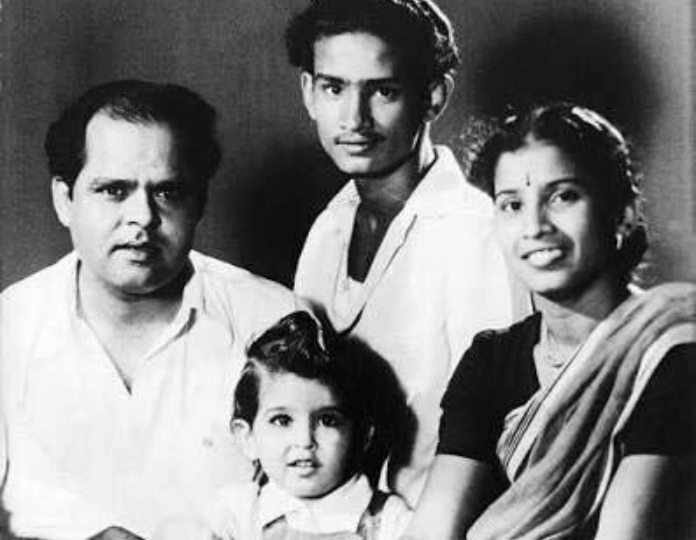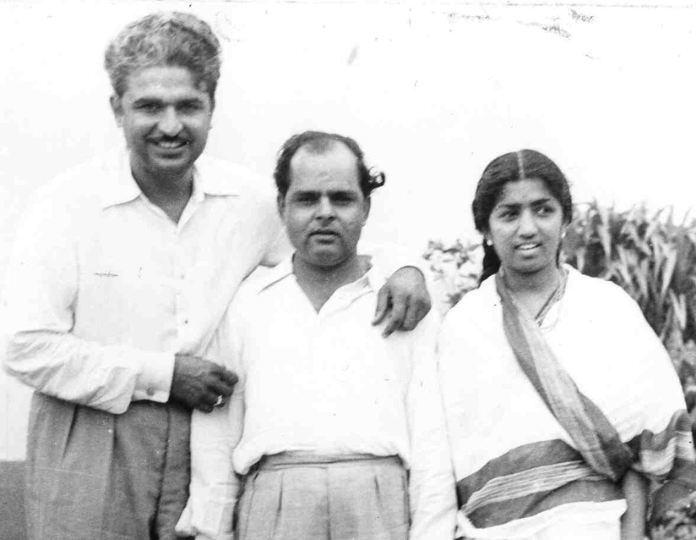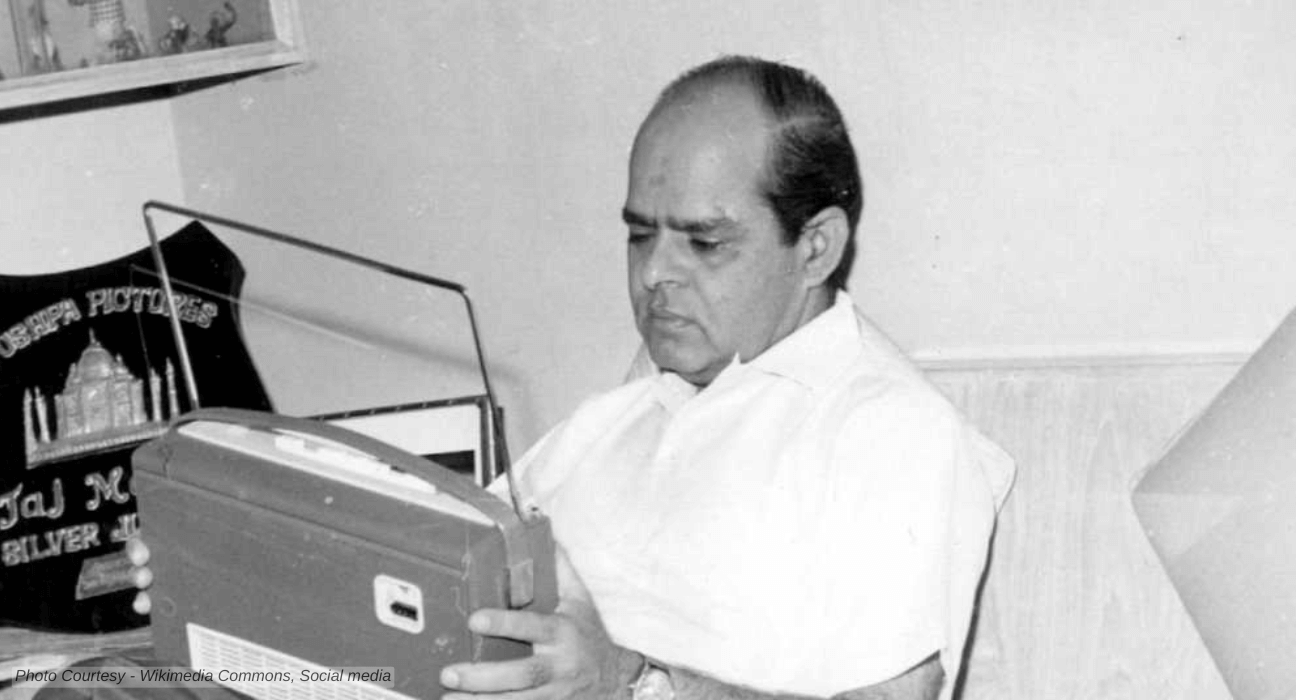Legendary musician Roshan is remembered for his soulful tunes based on classical music in films like “Naubahar,” “Barsaat Ki Raat,” “Taj Mahal,” “Dil Hi To Hai,” “Chitralekha,” “Mamta,” “Bahu Begum,” and many more.
Early Life
Roshan Lal Nagrath was born on July 14, 1917, in Bharia, a small village in Surjewala, Punjab, now in Pakistan. Roshan moved to Shahjahanpur when he was in fifth grade. He started his music training under Master Barve and learned to play the harmonium.
After a few years, he moved to Lucknow and joined Marris College of Music, where he was trained under Pandit S. N. Ratanjankar. Roshan also learned Sarod from Ustad Alauddin Khan in Maihar. He trained in sarangi with Bundu Khan. Roshan was also a prominent “esraj” player. Roshan joined All India Radio (AIR) in Delhi in 1940 as a staff artist, playing esraj and composing for programs. He worked there for nearly a decade.
Roshan In Bombay
Roshan moved to Bombay in 1948 to pursue a career in the film industry. He started as an assistant to Khawaja Khurshid Anwar on Singaar (1949). His break came with Kidar Sharma, who hired him for Neki Aur Badi (1949), though it flopped. His big break came with Kidar Sharma’s “Baawre Nain,” which starred Raj Kapoor and Geeta Bali, in 1950. The film turned out to be a big musical hit. The song “Khayalon Mein Kisi Ke Is Tarah Aaya Nahin Karte,” sung by Mukesh and Geeta Dutt, became very successful. One more song that became a cult classic was Rajkumari’s “Sun Bairi Balam Sach Bol Re, Ib Kya Hoga.” The song was a favorite of music legend Anil Biswas. He even requested the then 75-year-old Rajkumari to sing in a TV program, which she did spectacularly.

Throughout the 1950s and 1960s, Roshan composed music for many successful films, working with legendary singers like Mohammad Rafi, Manna Dey, Mukesh, Talat Mehmood, and Lata Mangeshkar. Some of his notable films in the 1950s include Malhar (1951), Anhonee (1952), Naubahar (1952), Chandni Chowk (1954), Do Roti (1957), Heera Moti (1959), and many more. In this period he frequently worked with Shailendra Ji.
Some of his notable songs in this period are “Bade Aarmanon Se Rakha Hai Balam Teri Kasam (Malhar),” “Main Dil Hoon Ek Armaan Bhara (Anhonee),” “Ae Ri Main To Prem Deewani (Naubahar),” “Mohabbat Ke Jhoothe Saharon Ne Loota (Sansakar),” “Holi Khele Nandlala Biraj Mein (Mashuqa),” “Hamen Ae Dil Kahin Le Chal (Chandni Chowk),” “Salaam-E-Hasrat Qubool Kar Lo (Babar),” and many more.
The Power Of Simplicity
One of his most famous collaborations came with Sahir Ludhiyanvi. Their first film was Babar in 1960, which has the famous Sudha Malhotra song “Salaam-E-Hasrat Qubool Kar Lo.” The same year they team up for the Bharat Bhushan and Madhubala starrer film “Barsaat Ki Raat.” The film became one of the biggest blockbusters of the year with its songs becoming a rage. The songs of the film, like “Zindagi Bhar Nahin Bhoolegi Woh Barsaat Ki Raat,” “Jee Chahta Hai Choom Loon,” “Maine Shayad Tumhe Pehle Bhi Kahin Dekha Hai,” “Na To Karvan Ki Talash Hai,” and “Yeh Hai Ishq Ishq,” are still favorites of countless music lovers.
In 1963, they worked on films like “Dil Hi To Hai,” and “Taj Mahal” were the biggest musical hits. The composition “Laaga Chunri Mein Daag,” in Dil Hi To Hai, sung by Manna Dey, became an example of how to use classical Ragas in films. It also has chartbusters like “Nigahen Milane Ko Jee Chahta Hai,” “Tum Agar Mujhko Na Chaho,” “Yun Hi Dil Ne Chaha Tha,” and “Jo Baat Tujh Mein Hai. ” Taj Mahal was Roshan’s crowning glory with the evergreen Lata-Rafi number “Jo Wada Kiya Wo Nibhana Padega.” The film also has songs like “Khuda-E-Bartar,” “Paaon Chhoo Lene Do,” and “Chandi Ka Badan.” The film later earned him his first and only Filmfare Award for Best Music Director.
Roshan and Sahir
In 1964, Roshan and Sahir came up with “Chitralekha,” which was acclaimed for its classical quality. Songs like “Ae Ri, Jane Na Dungi,” “Sakhi Ri, Mera Man Uljhe,” “Sansar Se Bhage Phirte Ho,” “Man Re, Tu Kaahe Na Dheer Dhare,” and “Maara Gaya Brahmachari” are especially noteworthy. The team of Roshan and Sahir again collaborated in 1964 for Bharat Bhushan’s “Dooj Ka Chand.” The film’s music is especially famous for its classical composition, “Phool Gendava Na Maro,” by Manna Dey. It also has one of Hindi cinema’s finest bhajans, “Binati Suno Meri Avadhpur Ke Basaiya,” by Geeta Dutt and Manna Dey. Playful “Sajan Salona Maang Lo Ji” by Asha and Lata and heartbreaking “Pade Barkha Phuhar Kare Jiyara Pukar” by Lata were based on folk music. The film also has Mohammed Rafi’s “Mehfil Se Uth Jane Walo” and Asa Singh Mastana’s “Lo Apna Jahan Duniyawalon.”
The duo worked last time for Bahu Begum (1967), starring Meena Kumari, Ashok Kumar, and Pradeep Kumar. The film was a musical hit with songs like “Duniya Kare Sawaal,” “Nikle the Kahan,” “Hum Intezar Karenge Tera Qayamat Tak,” and “Waqif Hoon Khoob Ishq Ke Tarz-E-Bayaan Se Main.”


Later Work
The 1966 film “Mamta” is also remembered for its songs like “Chupa Lo Yun Dil Mein Pyar Mera,” “Rahen Na Rahen Hum,” “Rahte The Kabhi Jinke,” and “In Baharon Mein.” Roshan’s other notable films were Zindagi Aur Hum (1961), Aarti (1962), Soorat aur Seerat (1962), Bedaag (1965), Bheegi Raat (1965), Daadi Maa (1966), Nai Umar Ki Nai Fasl (1965), Devar (1966), Noor Jehan (1967), Anokhi Raat (1967), and Dur Nahin Manzil, which was released posthumously in 1973.
Some of his notable songs include “Kabhi To Milegi Kahin To Milegi,” “Tere Bin Saajan Laage Na Jiya Hamaar” (Aarti),” “Bahut Diya Dene Wale Ne Tujhko (Soorat aur Seerat),” “Gham-E-Hasti Se Bas Begaana Hota (Vallah Kya Baat Hai),” “Aise Toh Na Dekho Ki,” “Mohabbat Se Dekha Khafa Ho Gaye Hain,” “Dil Jo Na Keh Saka,” (Bheegi Rat),” “Karvan Guzar Gaya Gubar Dekhte Rahe (Nai Umar Ki Nai Fasal),” Usko Nahin Dekha Humne Kabhi (Daadi Maan),” “Aaya Hai Mujhe Phir Yaad,” “Baharon Ne Mera Chaman Loot Kar” (Devar), “Aa Gaya Lab Pe Afsana” “Sharabi Sharabi Ye Sawan Ka Mausam” (Noor Jehan), “Mehlon Ka Raja Mila” “Meri Beri Ke Ber Mat Todo,” “Mile Na Phool Toh Kaanto Se Dosti Kar Li,” “Oh Re Taal Mile Nadi Ke Jal Mein,” Liye Chal Gadiya O Mere Mitwa Door Nahin Manzil (Anokhi Raat), and many more.
Personal Life
Roshan married Ira Moitra in 1948 after moving to Bombay. They had two sons: Rakesh Roshan (born 1949), an actor and director, and Rajesh Roshan (born 1955), a music director. He lived privately, focusing on family. His death left Ira to raise their children, who carried forward his legacy. Roshan suffered chronic heart issues for over 20 years. He died of a heart attack on November 16, 1967, at a social gathering in Bombay, aged 50.
Roshan’s legacy lives on through his music and his family, including his sons Rakesh Roshan and Rajesh Roshan and his grandson Hrithik Roshan.
Roshan on IMDB














Leave feedback about this